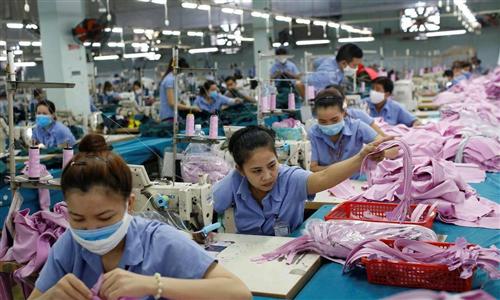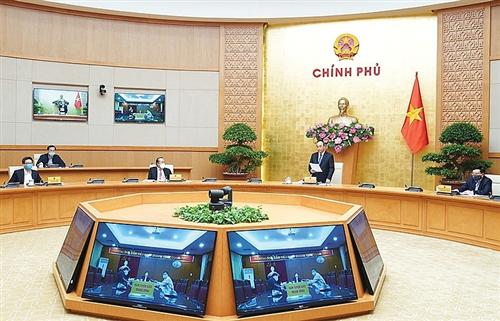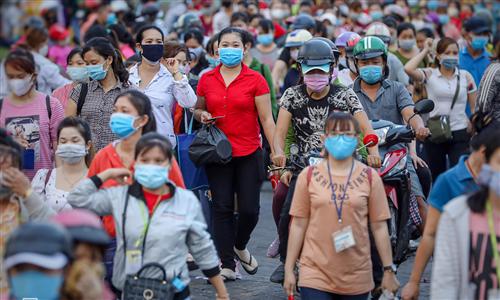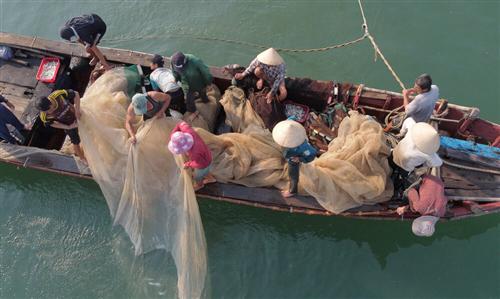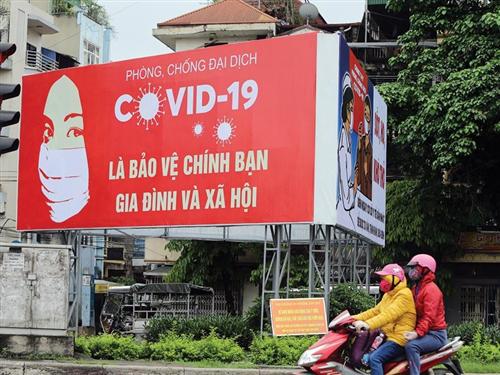VEPR examines scenarios for economic growth during COVID-19 outbreak
VEPR examines scenarios for economic growth during COVID-19 outbreak
The Government should tax all rice exports instead of issuing quotas to stabilise domestic rice prices during the COVID-19 pandemic. 
The recommendation was made by the former director of the Viet Nam Institute for Economic and Policy Research (VEPR), Nguyen Duc Thanh, during an online conference on Monday.
Many Vietnamese businesses are queuing up to export rice but the Government last Friday slashed its export quota by 40 per cent from last year to 400,000 tonnes in April.
Given the serious outbreak, businesses want to promote rice exports because global prices are going up due to increasing demand for rice reserves.
Thanh said the Government was concerned about national food security although Viet Nam was one of the biggest rice exporters in the world.
“The export of rice or reserves must be based on accurate figures and more transparent,” Thanh said.
“If the Government agrees to tax rice exports, which may be 15 or 20 per cent, it will help stabilise domestic rice prices, while the tax can be used for COVID-19 prevention,” he added.
He said when profits from rice exports fell, businesses would concentrate on the domestic market.
Rice exports were a ‘hot’ issue raised by economic experts during the online conference hosted by the VEPR, during which it announced an independent assessment of Viet Nam’s macroeconomic performance, with support from Konrad-Adenauer Stiftung (KAS).
Three scenarios for economic growth
According to Director of VEPR Pham The Anh, Viet Nam’s GDP growth rate of 3.82 per cent in the first quarter of this year was quite positive compared to other economies in the region. However, this increase did not fully reflect the impact of the COVID-19 pandemic, which is also affecting the informal sector, including small restaurants and hairdressers.
For Viet Nam’s economic prospects in 2020, the VEPR offered three scenarios.
The first scenario revolves around the pandemic being controlled by May and all economic activities gradually returning to normal with a recovery at the end of the second quarter of the year.
The agriculture, forestry and fishery sector would see negative growth (decrease by 2-3 per cent), as would mining throughout the year.
In term of services, the most affected sectors would include transportation and warehousing, accommodation and catering services, arts and entertainment (reduction of 20-50 per cent).
Health, media and finance - banking - insurance would maintain good growth thanks to their activities related to the prevention of COVID-19.
From the third quarter to the end of the year, the growth of industries could return to similar rates seen in recent years. The whole year’s growth rate would reach 4.2 per cent.
For the second scenario, it is assumed that the pandemic would continue until August. The world would continue social distancing due to the outbreak at many important economic and financial centres. Economic activities would only return to normal at the end of the third quarter.
The second and the third quarters would see negative GDP growth of 4.9 per cent and 1.1 per cent, respectively, marking growth for the whole year of 1.5 per cent.
The third scenario looks at the pandemic being controlled in November this year. During this period, the world would continue social distancing.
With this scenario, the economy would begin recovering in the second half of the fourth quarter this year.
GDP growth in the second and the third quarters were forecasted to be negative 5.1 per cent and 5.3 per cent, respectively, marking the whole year’s GDP growth to be negative 1 per cent.
The VEPR recommended that, in every situation, it was necessary to create the best conditions for businesses to operate with adaptive solutions to promote production as well as preventing the outbreak of COVID-19.
For businesses affected but still in operation, criteria would be needed to classify the level of impact, along with benefits including: exemption from social insurance fee, land rent and loan interest, extension of VAT collection, exemption from corporate income tax, and preferential loans for feasible business projects.
For businesses that had an effective transition, such as producing face masks for export, it would be essential to give them preferential policies to promote production.










